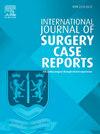First time use of trans-anal endorectal pull through (Soave procedure) for management of recurrent rectal mucosal prolapse in children not responding to the conventional sclerotherapy interventions: A case series
IF 0.6
Q4 SURGERY
引用次数: 0
Abstract
Introduction
Recurrent rectal mucosal prolapse in pediatric patients poses a therapeutic challenge, particularly when conventional treatments like sclerotherapy fail. This case series evaluates the Transanal Endorectal Pull-Through (Soave) procedure as a surgical alternative for children unresponsive to sclerotherapy, emphasizing its ability to preserve sacral plexus integrity.
Case presentation
Three pediatric cases (6.5-, 10.5-, and 14-year-old boys) with chronic constipation and recurrent rectal mucosal prolapse, unresponsive to sclerotherapy, underwent the Soave procedure. Hospital stays lasted 7–8 days, with no intra- or postoperative complications. Follow-ups at 6–12 months showed no recurrence, resolution of constipation, and high guardian satisfaction.
Discussion
The Soave procedure demonstrated efficacy and safety in treating recurrent rectal mucosal prolapse, with no recurrences or complications over one year. Unlike rectopexy, which risks constipation and incontinence, the Soave procedure preserves rectal integrity, minimizing pelvic trauma. Despite limitations such as small sample size and short follow-up, findings align with literature supporting minimally invasive techniques. Further research, including multicenter studies with larger sample sizes, is needed to confirm long-term outcomes.
Conclusion
The Soave procedure is a promising surgical option for recurrent rectal mucosal prolapse in children unresponsive to sclerotherapy, offering reduced recurrence and complications. Larger, long-term studies are essential to validate its efficacy.
求助全文
约1分钟内获得全文
求助全文
来源期刊
CiteScore
1.10
自引率
0.00%
发文量
1116
审稿时长
46 days

 求助内容:
求助内容: 应助结果提醒方式:
应助结果提醒方式:


